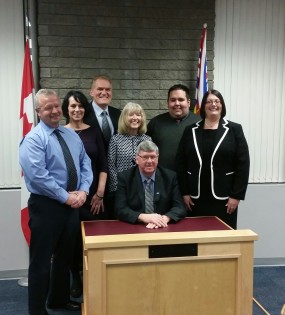New Trustees Look Back on ‘Busy’ Year
Prince George, B.C. – It’s been officially one year since last year’s local election results were made official, and if there’s one thing the three newest members of the Prince George School Board agree upon is how busy they’ve been.

The Prince George School Board, from left, Bob Harris, Trish Bella, Bruce Wiebe, Sharel Warrington, Tim Bennett, Brenda Hooker and Tony Cable – photo 250News
“As a former principal in the district I went into this trustee role with my eyes open,” says board chair Tony Cable. “I knew I’d be working hard and have lots of meetings but it’s been a little busier than that.”
He says the board’s been busiest focusing on three main areas: rural education (they created an ad-hoc rural education committee) working on their strategic plan, and considering a new facilities report.
“All of those added to our workload but those are all underway now and hopefully we’ll start to hit our stride with those ones and it won’t be quite as busy as when we started.”
Another thing the trio agree on is how challenged they’ve been when it comes to funding from the provincial government.
“And trying to make sure we are able to provide good quality educational programming,” says Bob Harris. “That’s one of the biggest challenges no question.”
Bruce Wiebe adds trustees were dealt a real blow when the provincial government announced districts would have to find administrative savings of $725,000 this year and a further $626,000 in 2016-17 ($54 million province wide over the two school years).
At the time Premier Christy Clark referred to the cuts as “low-hanging fruit.”
“Those kind of things suddenly make you feel there’s a change in direction.” he says.
“You had some goals you were focused on helping with things like educational development and looking at the new learning curriculum but we had to readjust our thinking to accommodate some budget issues we didn’t anticipate.”
Looking ahead, Cable says a top priority will be lobbying the provincial government to give exempt staff, including principals and vice principals, their first raise since 2009.
Harris adds the board will have some big decisions on its hands.
“We have some fairly substantial decisions and some of them are beyond our control. For example capital funding for school replacement,” he says.
“It’s been a challenging but in many ways a rewarding experience so far.”

Comments
Look look over there, challenging expectations….
Meanwhile, back in the rural parts of the district like Mackenzie and Valemount they are still waiting for word on how bit a ward process can be implemented prior to the next election (with time running out)… so as to have a representative for their communities on the future school boards. I think if you asked those folks they would have that as one of their top priorities.
“…the board’s been busiest focusing on three main areas: rural education (they created an ad-hoc rural education committee)…”
In the space of a year this ‘priority’ has resulted in the formation of a committee which actively refuses to have public representatives from rural communities among its members. If you live in one of these communities your only chance for input is in ONE 2-hour meeting in each community where you participate in strictly-defined exercises facilitated by outside consultants. If you don’t get to address the issues you feel are important to rural education in these exercises then your only other option is to make a written submission to which the committee is under no obligation to respond.
With no public representatives on the committee, there is no opportunity to argue for the perspective of families using rural schools when committee discussions are being held. I fear that this whole effort will result in a little talk and even less action.
Comments for this article are closed.